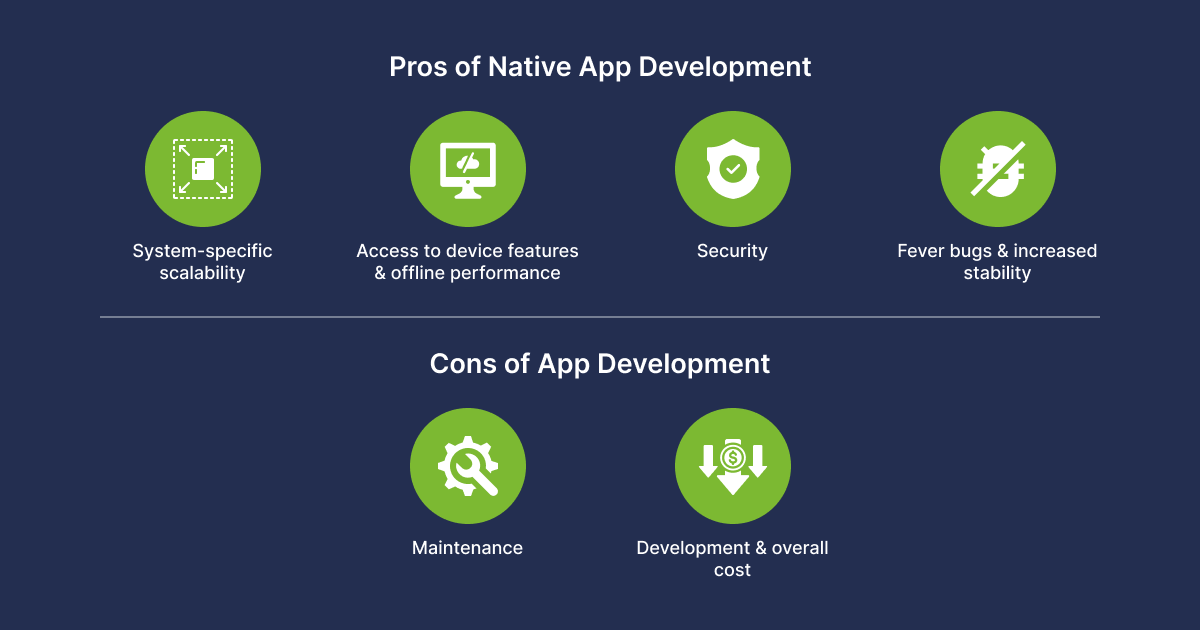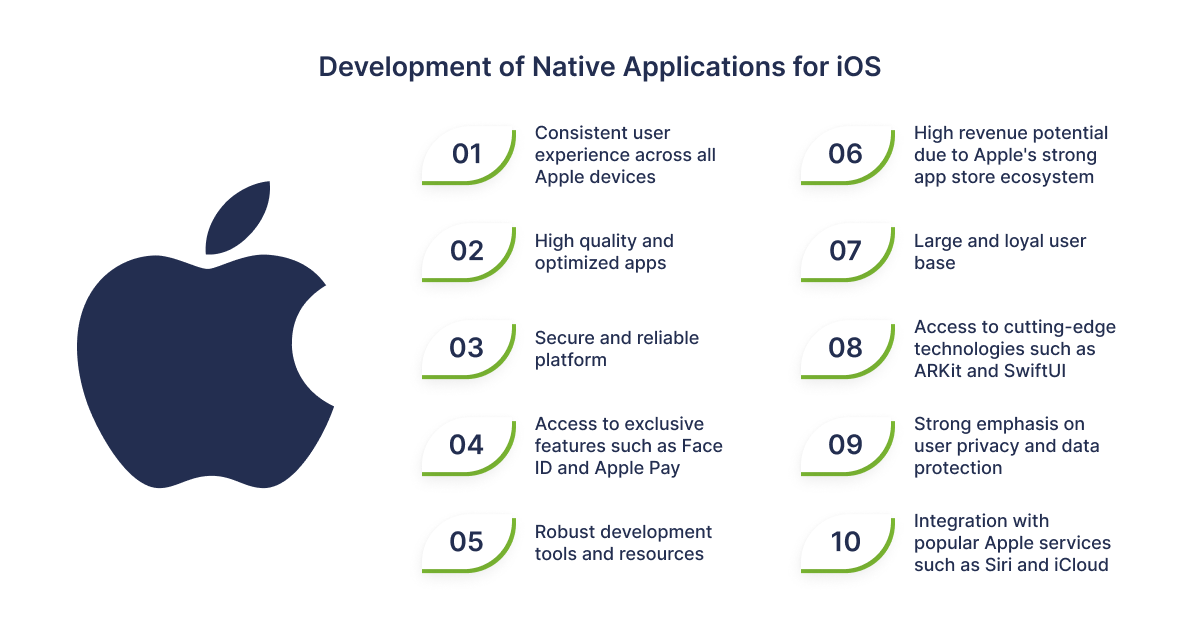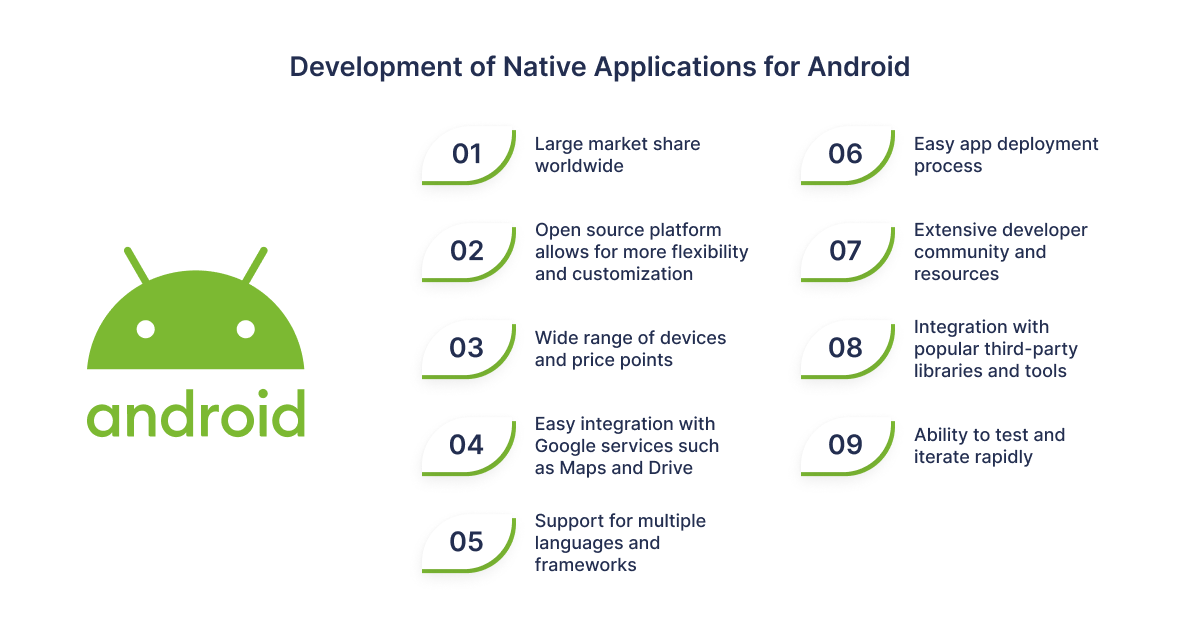Native Mobile App Development: What is it? Pros & Cons
The most popular way to create mobile applications and programs is native. It involves writing a product for a specific platform — Android or iOS. Most of the feedback from customers about native applications is positive; below we will try to figure out why.
Pros and cons of native applications
What is native app development? The created mobile program is adapted to one of the platforms (Android or iOS). The specification causes greater user engagement compared to hybrid applications due to more coordinated work and attractive appearance. The difference between web applications and websites lies in the fact that native applications do not work in browser: to use their functions, you need to download the product from the store.

What advantages have native mobile applications got?
- Spectacular performance. Customizing for a specific platform, using its programming languages and APIs, makes the product faster and more efficient. Installing the application on the gadget allows rational using the device's computing power.
- Guarantees security and confidentiality of user data.
- Interactivity and intuitiveness. Native programs respond quickly to data entry. Synchronizing the user experience with a specific operating system simplifies its use and enables control of the application with clear actions and gestures.
- Instant access to device hardware (camera, microphone, GPS) and platform APIs and tools.
- Fewer errors, unlike hybrid programs that depend on technologies for their development (Xamarin, Cordova), which becomes especially noticeable after platform updates.
- High scalability.
Among the disadvantages of native applications, one can find as follows:
- High development cost, particularly when Android and iOS versions must be launched.
- Long duration of the project. First, it is needed to create a product for one platform, then for another one.
- The need to download updates for fixing errors. Sometimes users may be unaware of the availability of updated versions or avoid it in order to conserve space.
| Pros of Native Applications | Cons of Native Applications |
|---|---|
| High performance and speed | Higher development costs |
| Better user experience | Longer development time |
| Improved reliability | Platform-specific development |
| Access to device features | App store approval process |
| Offline functionality | More difficult to maintain |
| Enhanced security | Limited cross-platform support |
| Greater customization | Need for multiple code bases |
| Integration with hardware | Limited reach and audience |
| Access to push notifications | Updates require user action |
| App store discoverability | Requires installation |
| Increased monetization | Potential for compatibility issues |
Read also: Best Technologies for Mobile Application Development
Development of native applications for iOS
Native iOS app development has its own characteristics. Firstly, this platform is completely closed and created for Apple devices. iOS product development is done on a Mac computer. Programming tools include:
- iOS SDK, combined with framework Cocoa Touch UI;
- XCode, officially IDE for writing applications for iOS;
- Swift Playgrounds – learning platform for creating Swift;
- Test Flights – a component that provides beta-testing.

Development of native applications for Android
Android programs are written using Java, Kotlin, C++. Effective native Android app development tools are:
- Android Software Development Kit (SDK). The solution comes with Android Studio and is officially recognized as an IDE (Integrated Development Environment) for Android;
- command row tools for Windows, Mac, Linux;
- Firebase – a multifunctional platform;
- Android Jetpack – a set of ready-made solutions.
External tools outside the Google system can also be used.

Create your own mobile application in cooperation with an experienced team of developers
The development of native applications is carried out by the SDH team. We create effective, productive programs for users who we can scale our business with.
- Native mobile applications for the customer is a comprehensively created product for personalized user interaction on each specific platform;
- Hybrid programs sometimes seem to be a better alternative to native products, and we are always ready to assist in implementing this idea;
- Working on the program, we strive to offer an intuitively understandable and convenient product for solving user problems. A sophisticated design and interface provides positive user experience, which makes it beneficial for customers.
The entire process of mobile development is carried out in stages, with careful control of each step and correction of possible shortcomings. SDH means experience in solving the most complex tasks and a focus on achieving results.
Categories
About the authors
Share
Need a project estimate?
Drop us a line, and we provide you with a qualified consultation.








